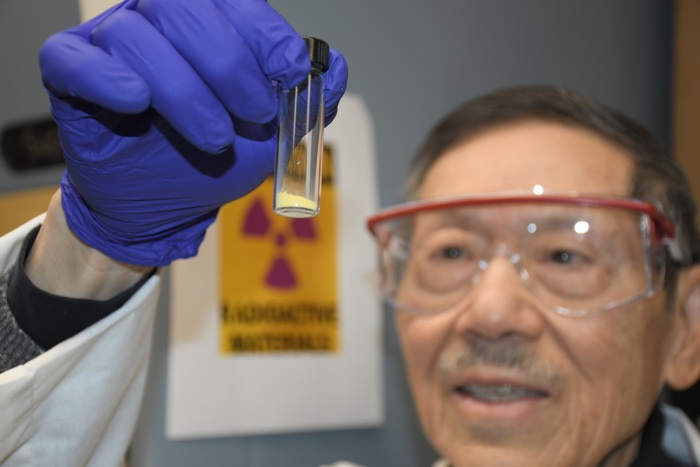Scientists have made a breakthrough that could open the doors to a whole new way of producing nuclear fuel, and they did it using nothing but the power of the ocean – or at least the chemicals floating inside it.
Researchers in the US used a specially designed yarn to extract natural trace amounts of uranium found in seawater, and their proof of concept snared enough of the element to make five grams of yellowcake – a powdered uranium concentrate used as fuel in nuclear power production.
"This is a significant milestone," says biogeochemist Gary Gill from Pacific Northwest National Laboratory (PNNL).
"It indicates that this approach can eventually provide commercially attractive nuclear fuel derived from the oceans – the largest source of uranium on Earth."
 The first gram of powdered yellowcake (LCW Supercritical Technologies)
The first gram of powdered yellowcake (LCW Supercritical Technologies)
In order to pull this off, the PNNL team – which is part of the US Department of Energy – teamed up with scientists from a company called LCW Supercritical Technologies.
Researchers at LCW had developed a special acrylic fibre designed to extract uranium from seawater, by attracting and holding onto dissolved uranium naturally present in the ocean.
"We have chemically modified regular, inexpensive yarn, to convert it into an adsorbent which is selective for uranium, efficient and reusable," explains LCW president Chien Wai.
"PNNL's capabilities in evaluating and testing the material, have been invaluable in moving this technology forward."
In previous research, Wai helped pioneer the foundations of this kind of extraction process, which adsorbs uranium onto a molecule or ligand that is chemically bound to the acrylic fibre of the yarn.
The yarn is then placed directly in ocean water – or in seawater pumped into the lab –where, given enough time, it naturally extracts uranium floating by.
Scientists have been working to optimise this kind of technique for years, and the pay-off could one day be huge.
Not only because it's a lot easier to extract uranium if you don't have to dig it up, but because of the virtually infinite supply we could be looking at.
"Concentrations are tiny, on the order of a single grain of salt dissolved in a litre of water," researcher Yi Cui from Stanford University, who wasn't involved in the current work, explained when describing similar research last year.
"But the oceans are so vast that if we can extract these trace amounts cost effectively, the supply would be endless."
According to Wai, the adsorbent material is inexpensive to manufacture, and the researchers estimate a scaled-up process would be competitive with the costs of land-based mining of uranium.
Perhaps more significantly, the team estimates there is at least 4 billion tonnes of uranium in lying in wait in the ocean, which is around 500 times the amount known to exist in land-based ore.
There's more work to be done here – including investigating what other kinds of chemicals this fibre can extract – but we could be on the verge of something huge in energy production.
